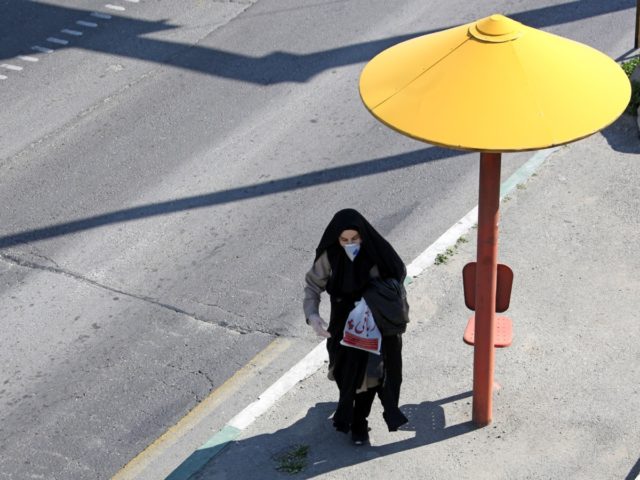Dr. Rick Brennan, Director of Emergency Operations for the World Health Organization’s Emergencies Program, said on Monday the number of coronavirus deaths in Iran could be up to five times higher than the official numbers released by the Iranian health ministry.
Iran officially counts 853 deaths and 15,000 infections, but Brennan feared the true totals could be much higher due to limited testing.
“We’ve said the weakest link in their chain is the data. They are rapidly increasing their ability to test and so the numbers will go up,” said Brennan, who visited Iran last week. He estimated that only one in five coronavirus cases has been properly identified in Iran.
Brennan was also deeply concerned about Syria, whose long civil war – with Iranian participation – destroyed many medical facilities and left others hopelessly over-stressed, while a million displaced Syrians live among the ruins or huddle in crowded refugee camps. Syria has not officially reported any coronavirus cases yet.
“We are very concerned. All of the surrounding countries have documented cases,” he said.
A source inside Iran’s Coronavirus Combat Task Force told Radio Farda on Monday that hospital data indicates the true number of deaths in Iran is already well over 2,000 and probably over three times the official count of 853. The source spoke anonymously due to fears for his safety.
“It is absolutely true that the political system considers coronavirus death numbers a matter of national security, the Revolutionary Guard for instance, and insists on hiding the facts like many other things the public has never been privy to know. The Health Ministry’s approach, however, if not completely but at least to a large extent, is based on medical protocols and procedures, not political considerations,” the Iranian source explained.
Radio Farda’s own review of data from Iranian provincial authorities and local media confirmed at least 1,300 deaths and 3,200 people hospitalized across 30 of Iran’s 31 provinces.
According to Radio Farda, many Iranians blame Supreme Leader Ayatollah Ali Khamenei and his “hardliners” for the epidemic because they deliberately concealed the early outbreak in the city of Qom in order to keep turnout higher for the February 21 parliamentary elections. Khamenei actually said the early reports of an epidemic in Qom were merely “enemy” propaganda intended to scare voters away from the ballot boxes.
The Iranian opposition group PMOI/MEK claimed over the weekend there have been over 4,900 coronavirus fatalities, accusing the regime of deliberately concealing most of them because it fears a public backlash that would fill the streets with protesters. According to PMOI/MEK, hundreds have died even in the smaller Iranian cities, one of which was forced to begin storing corpses in refrigerated containers normally used to hold fruits and vegetables.
The opposition group was able to get a few Iranian officials to go on the record with complaints about government incompetence and fears of political instability:
“The objective of various officials in remarks about a bio-terrorism attack is to refer all the problems resulting from the COVID-19 management crisis to foreign enemies… However, it is more likely that an enemy by the name of mismanagement is far more probable than a biologic attack by our enemies,” said Amir Khojasteh, deputy chair of a committee in the regime’s Malis (parliament).
“We wasted a lot of time … there was no strategic plan to use the experience of other countries and maybe some measures were carried out with drastic delays… Currently we are witnessing an exponential growth in the number of coronavirus cases in Tehran, and Tehran Province has far more cases in comparison to other provinces… and our medical staff could be completely exhausted in the future,” said Alireza Zali, a senior official in Tehran’s anti-coronavirus headquarters.
“We must admit that we lost a golden opportunity and must compensate… the number of coronavirus cases is rising exponentially… the virus is has become a pandemic… the medical staff in Mashhad is exhausted… the word pandemic is horrific. This situation may escalate and get out of our control,” said the mayor of Mashhad, the country’s second largest city located in northeast Iran.
There is also escalating concern among regime officials over protests erupting in Iran.
“Beyond foreign threats, domestic issues such as protests revolutions, coup de ’tat, famine and epidemics can disrupt a country’s security and stability, and even lead to a complete crumble… the coronavirus crisis in Iran linking to previous developments, including the November 2019 incidents, will lead to further protests,” an analysis in the state-run Mizan daily reads. The country’s military and Revolutionary Guards (IRGC) can “take over the country’s security and impose necessary restrictions to decrease the amount of concern over the spread of a virus…” This further indicates the regime’s main concern of security threats disrupting the stability of its already fragile apparatus.
An Iranian living in Isfahan reportedly told PMOI/MEK that Iran’s government might have spread the coronavirus “intentionally” to “divert attention from their mess and crimes” and implement martial law to control political unrest ahead of the Iranian New Year celebrations in March.
Another PMOI/MEK report on Monday suggested heavy “political infighting among the mullahs” during the epidemic and updated the total number of largely unreported dead to over 5,500.
Some of this infighting was said to be caused by religious and political resistance to effective quarantine measures, including hardliners who refuse to reallocate funding away from Iran’s Islamic Revolutionary Guard Corps (IRGC) and its foreign terrorist operations. The report charged the central government with thwarting efforts by provincial governors to impose quarantines because President Hassan Rouhani is jealous of his power and reluctant to take extreme measures that would reveal the true severity of the outbreak, making the public even angrier at how his administration handled the early coronavirus response.

COMMENTS
Please let us know if you're having issues with commenting.